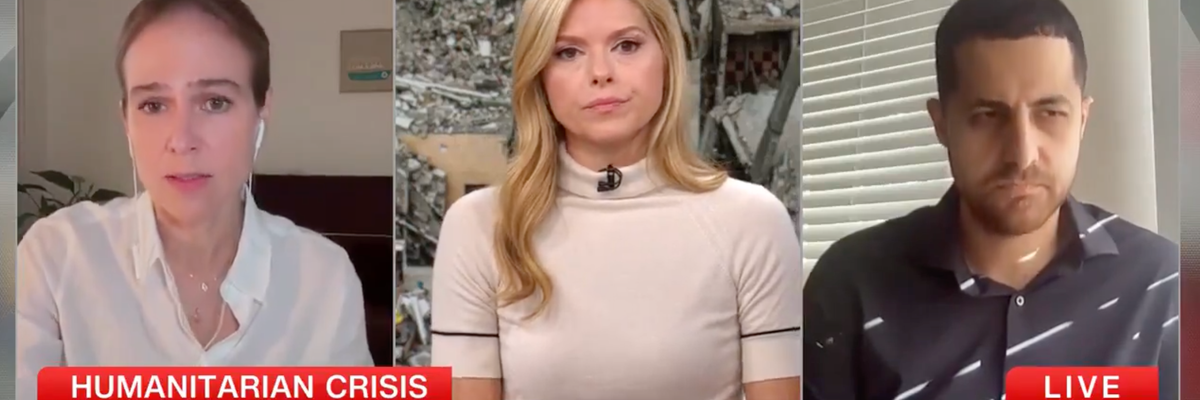Human rights advocates on Friday highlighted a rare instance in which a U.S. corporate media outlet allowed a pro-Palestinian voice to set the record straight about Israel's crimes against humanity in Gaza.
Earlier this week,
CNN "News Central" aired a panel segment on the anniversary of the October 7, 2023 Hamas-led attack on Israel and Israel's retaliatory war. Anchor Kate Bolduan noted that around 1,200 people were killed during the Hamas attack—although she did not say that at least some of them were slain by Israeli forces in "friendly fire" incidents and under the Hannibal Directive—and that 250 others were kidnapped.
Bolduan also acknowledged that nearly 42,000 Palestinians have been killed and another 2 million displaced by Israeli forces, calling the situation in Gaza a "desperate humanitarian crisis."
"A humanitarian crisis is what you deal with when you have a hurricane, what you deal with when you have an earthquake."
The anchor asked panel participant Dr. Tanya Haj-Hassan—an American pediatric intensive care physician who volunteered for two weeks at Al-Aqsa Martyrs Hospital in Deir al-Balah in the central Gaza Strip—for her thoughts on the matter.
"In all honesty, a humanitarian crisis is what you deal with when you have a hurricane, what you deal with when you have an earthquake," Haj-Hassan replied. "This is not a humanitarian crisis."
"Kate, and I'm going to say it very clearly for your viewers to hear, this is genocide," the doctor stressed.
Haj-Hassan continued:
When 70% of the population that are killed are women and children, when the population is starved of food, of water, of medicine, when you have attacks, repeated attacks on all the hospitals, the clinics, the aid distribution sites, the humanitarian aid agencies that tried to help, more [United Nations] workers have been killed in Gaza than in U.N.'s history. When you have
over 900 families that have been exterminated, that have been taken off of the civil registry, killed, when you have over 17,000 children that have lost one or both parents, when you have bakeries, aid distribution sites, churches, mosques, schools, and in the last three days—in the last 24 hours in fact—a hospital today that was bombed, as you just reported, the hospital where I personally was working, and I can tell you, they are working every second of every day to try and sustain life.
"And so it's really hard to hear it over and over and over again, framed in the way that it's being framed in the media, which, frankly, Kate, is very misleading," Haj-Hassan said. "It is very misleading. Three hundred and sixty-five days of this. Death tolls that are so far outdated we have... no idea how many people are killed."
"But I am... genuinely afraid about what we're going to find out when the dust settles. History books will be written on this," she added. "And countries will have to reckon—media agencies will have to reckon—with their major role in the genocide of an entire population and in the destruction of humanitarian law and rule of order."
Some observers noted the absence of voices like Haj-Hassan's in U.S. mainstream media coverage of Gaza, which is overwhelmingly pro-Israel and almost never airs the word "genocide"—even as Israel is on trial for the crime at the International Court of Justice (ICJ).
The New York Times, for example, ordered journalists covering the war in Gaza to eschew terms including "genocide," "ethnic cleansing," and even "occupied territory," even though Israel has indisputably occupied Palestine for over half a century and the ICJ recently ruled that the Israeli occupation is a crime of apartheid that must end immediately.
"The media may be forgiven for missing a carefully hidden story. For missing some details," Quincy Institute for Responsible Statecraft executive vice president Trita Parsi said Friday on social media. "But when a genocide is there for everyone to see and you help conceal it, forgiveness is not in the cards."
Another social media user offered mild praise for Bolduan—who has been criticized by Israel supporters for previous interviews in which Palestine defenders accused Israel of genocide—writing that the anchor "didn't seem happy" to hear what Haj-Hassan was saying.
"Hard to say whether it was because the truth is so horrible or because CNN doesn't want to report that truth—but she did let her say it," the user said of Bolduan.
Allegations of Israeli genocide remain highly contentious—even taboo—in the United States, which provides the key Mideast ally with
tens of billions of dollars in military aid and diplomatic cover including multiple vetoes of United Nations Security Council cease-fire resolutions that were overwhelmingly supported by other countries.
In the United States, Palestinians, Palestinian Americans, and human rights groups are
asking the 9th U.S. Circuit Court of Appeals to revisit a lawsuit they filed accusing President Joe Biden, Secretary of State Antony Blinken, and Defense Secretary Lloyd Austin of complicity in the Gaza genocide.
In July, a three-judge panel of the federal court dismissed the lawsuit, in which the U.S. District Court for the Northern District of California previously found that "the current treatment of the Palestinians in the Gaza Strip by the Israeli military may plausibly constitute a genocide in violation of international law," but dismissed the case on jurisdictional grounds.

